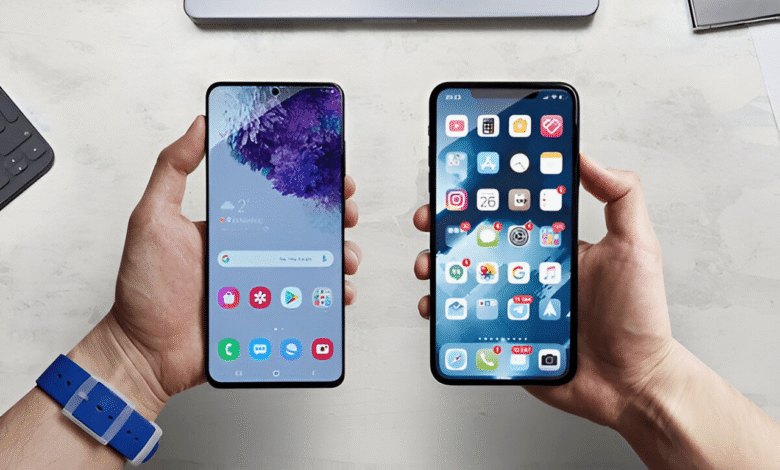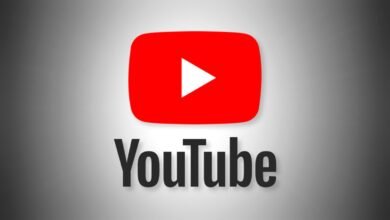Android vs iOS: Which Wins in the U.S. in 2025
Android vs iOS 2025. Comparing market share, features & trends to see which mobile OS dominates the U.S. smartphone market this year.

The Android vs iOS rivalry continues to shape the smartphone landscape as we move deeper into 2025. Both operating systems have evolved significantly, leveraging cutting-edge AI, refined user experiences, and deeper ecosystem integrations to win over American consumers. While Apple’s iOS has historically dominated the U.S. market with its premium branding and loyal customer base, Android’s flexibility, affordability, and rapid innovation present a formidable challenge. This article dives into the key factors market share, technological advancements, privacy, app ecosystems, and consumer trends to determine which platform is leading in 2025.
The battle between Android vs iOS tech giants is more nuanced than ever. Apple’s tightly controlled ecosystem offers seamless integration across devices, while Android’s open-source nature fosters experimentation and wider hardware diversity. With AI becoming a central differentiator, both platforms are racing to deliver smarter assistants, predictive features, and enhanced security. Will Apple’s walled garden continue to reign supreme, or will Android’s adaptability and aggressive pricing strategies tip the scales? By examining the latest data and trends, we aim to answer the pressing question: Which OS wins in the U.S. in 2025?
Android vs iOS
Consumer Preferences in 2025
The U.S. smartphone market remains a stronghold for iOS, with Apple maintaining a steady lead in market share, particularly among younger demographics and higher-income households. The iPhone’s brand loyalty is unmatched, with many users staying within the Apple ecosystem due to its seamless connectivity with MacBooks, iPads, and Apple Watches. However, Android is far from being overshadowed.
By analyzing factors
By analyzing factors such as affordability, customization, privacy, app ecosystem, and 5G integration, we aim to provide a comprehensive comparison. Both platforms have their strengths Android leads in global market share, while iOS excels in user retention and premium experiences. Will Apple’s closed ecosystem continue to win over U.S. consumers, or will Google’s open-source flexibility and AI advancements tip the scales? Let’s dive into the details to see which OS claims victory in 2025.
Market Share
Regional differences also play a role in the Android vs iOS divide. Urban areas, where disposable income tends to be higher, show stronger adoption of iPhones, while suburban and rural markets lean toward Android due to competitive carrier deals and more affordable options. Additionally, the rise of foldable phones, spearheaded by Samsung’s Galaxy Z series, has given Android a boost in innovation perception. Rumors of Apple entering the foldable market in late 2025 could shift dynamics, but for now, Android holds the edge in this emerging category.
AI and Beyond
Artificial intelligence has become the defining battleground for Android vs iOS in 2025. Google’s Gemini AI deeply integrates with Android, offering advanced contextual awareness, real-time translation, and predictive app actions. Meanwhile, Apple’s Apple Intelligence enhances Siri, photo editing, and on-device processing, prioritizing privacy. While Android’s open ecosystem allows faster third-party AI adoption, iOS ensures a more controlled but highly optimized experience.
Technological Advancements
Another major differentiator is 5G and connectivity. Android vs iOS platforms now fully support 5G, but carrier optimizations vary. iPhones benefit from deep carrier partnerships, ensuring consistent performance, while Android devices especially Google Pixel and Samsung models often lead in network experimentation, such as mmWave and satellite connectivity. Battery efficiency and thermal management have also improved, with both operating systems leveraging AI to extend usage time.
A Growing Deciding Factor
For enterprise users and privacy-focused consumers, iOS remains the preferred choice, thanks to its consistent update rollout and stringent app review process. However, Android’s advancements in encryption and biometric security such as under-display fingerprint scanner make it a strong contender, especially for users who prioritize customization alongside security.
Privacy and Security
Privacy concerns have pushed both platforms to enhance security measures. Apple’s App Tracking Transparency (ATT) and end-to-end encryption across iMessage and FaceTime set a high standard. iOS also processes most AI tasks on-device, reducing data exposure. On the other hand, Android’s Privacy Dashboard and improved sandboxing provide granular control over app permissions, though its fragmented ecosystem means security updates aren’t always immediate across all devices.
Demographics
Apple’s dominance among younger demographics and higher-income households remains unchallenged, thanks to seamless integration with MacBooks, iPads, and Apple Watches. Meanwhile, Android’s diversity in hardware options attracts a broader audience, including those seeking affordability without sacrificing performance. Regional preferences also play a role urban areas show stronger iOS adoption, while suburban and rural markets lean toward Android due to carrier deals and pricing flexibility.
App Ecosystem
The App Store vs. Google Play debate continues, with Android vs iOS platforms offering distinct advantages. Apple’s App Store generates higher revenue per user, making it more lucrative for developers, while Google Play’s global reach and sideloading flexibility attract a broader range of apps. Subscription services and cloud gaming like Xbox Cloud Gaming and NVIDIA GeForce NOW are now widely available on both, reducing the exclusivity gap.
Developer Support
One key difference lies in app optimization. iOS apps are often released first and are more polished due to Apple’s strict guidelines and uniform hardware. Android, meanwhile, offers more experimental apps and greater freedom for developers, though fragmentation can lead to inconsistent performance across devices. Thanks to a diverse range of manufacturers including Android vs iOS continues to appeal to budget-conscious buyers and tech enthusiasts who prioritize customization and hardware variety.
The Future Foldables, Wearables, and Beyond
Foldable phones are no longer a novelty they’re a growing market segment. Samsung’s Galaxy Z Fold and Flip series have set the standard, offering multitasking capabilities that appeal to professionals. If Android vs iOS launches a foldable iPhone in late 2025 as rumored, it could redefine consumer expectations. Wearables also play a crucial role in the ecosystem battle. The Apple Watch remains the dominant smartwatch, tightly integrated with iOS, while Android’s Wear OS powered by Samsung and Google has improved significantly.
Read More: Top 10 Emerging Technologies That Will Shape the U.S. in 2025
Conclusion
The Android vs iOS competition in 2025 remains fiercely contested, with each platform excelling in different areas. iOS continues to lead in brand loyalty, privacy, and ecosystem cohesion, making it the preferred choice for users invested in Apple’s hardware lineup. Meanwhile, Android’s flexibility, affordability, and rapid AI advancements make it a strong alternative, particularly for those who value customization and cutting-edge hardware.
Ultimately, the “winner” depends on user priorities. If Android vs iOS seamless integration and premium experiences matter most, iOS holds the edge. If affordability, hardware diversity, and AI-driven innovation are key, Android takes the lead. As both platforms push the boundaries of technology, consumers in 2025 benefit from an unprecedented level of choice and innovation. The battle is far from over and that’s a win for everyone.
FAQs
Which OS has more users in the U.S. in 2025?
iOS maintains a slight lead in the U.S., but Android’s diverse device range keeps it competitive, offering better health tracking and third-party compatibility.
Is Android vs iOS better for privacy?
iOS is generally considered more secure due to strict app controls, but Android has improved significantly with its Privacy Dashboard.
Are foldable phones better on Android vs iOS?
Currently, Android leads in foldables (e.g., Samsung Galaxy Z series), but Apple may enter the market soon.
Which platform gets faster updates?
iOS updates roll out simultaneously to all supported devices, while Android updates depend on manufacturers.
Will AI make one OS better than the other?
Both are leveraging AI heavily iOS focuses on privacy-first AI, while Android offers more open integration with third-party tools.











